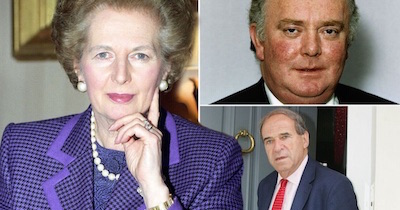
The discovery of new state papers about a network of high-profile establishment figures systematically abusing and trafficking children from the north of Ireland has added to suspicions that an ‘inquiry’ set up in County Down by the British government is merely an attempt to sideline the scandal.
Pressure in increasing for a proper inquiry into he network of pedophiles which operated out of Kincora Boys’ home in Belfast .
The papers reveal that Kincora was the focus of secret correspondence by intelligence agencies like MI5, whose agents were themselves at the heart of the pedophile network.
An official review into whether there was a Westminster cover-up of paedophile activity in the 1980s wound up last November, but these newly uncovered files were not included in the review.
While the details of the files have not been made public, it is known they document claims passed to the authorities by ex-British Army press officer Colin Wallace.
The papers should have been disclosed as part of a previous search of Home Office documents. Accompanying the files is a letter from the Permanent Secretary of the Cabinet Office Richard Heaton in which he apologises for “errors” in not locating the files before now.
The group of papers were found in a “store of assorted and unstructured papers”. Other documents thought to be relevant to related abuses in England and Wales have also been discovered.
New Zealand High Court judge Lowell Goddard, who is heading a fully-empowered inquiry into historical child sex abuse in England and Wales, has said she is to set to start again from scratch.
But the British government has insisted that all matters relating to Kincora should be passed to the ‘Northern Ireland’ Historical Institutional Abuse Inquiry (HIAI), a panel operating out of Bangor, County Down, which cannot compel witnesses or discover documents.
CABINET OF CRIME
Among the files are government papers and correspondence about the activities of Thatcher’s former Home Secretary, Leon Brittan, and her former parliamentary secretary Peter Morrison. Both men are now dead, Brittan, dying in January of this year.
The documents reveal that other members of Thatcher’s government were also pedophiles, and that senior British intelligence officers warned Thatcher’s cabinet that the allegations risked causing political embarrassment.
No consideration was given to the threat to children the unnamed politician posed.
“At the present stage . . . the risks of political embarrassment to the government is rather greater than the security danger,” the then director of MI5 observed.
Labour MP Danczuk said: “These explosive papers show what I’ve long suspected – that the full weight of the British establishment, including MI5, colluded in a cover-up to protect politicians who sexually abused young boys.
“That we can now see in black and white that the risk to children was not considered at all and the establishment was more worried about the risk of political damage to the government is a damning indictment of the shameful attitudes of the people running the country at the time.”
Former Kincora boy Richard Kerr has now identified several people who has says were involved in the paedophile network of VIPs who visited the boy’s home, or who received boys who were trafficked to them.
Among those he says were part of the cover-up of the network linked to Kincora were: Louis (‘Lord’ or ‘Earl’) Mountbatten, a cousin of the English queen; Maurice Oldfield, director of MI6; double agent Anthony Blunt, and Knox Cunningham, a unionist MP and senior Tory.
Know Cunningham helped to fund Tara, a paramilitary loyalist group. Its leader, William McGrath, a house master at Kincora and allegedly an MI5 agent, was one of three men jailed for four years for sexually assaulting boys at the children’s home.
Another former resident of Kincora, Gary Hoy, is currently making a legal challenge against the British government’s refusal to include the institution in the Goddard probe.
POWER GAME
What the documents do prove is that questions about Kincora were raised and discussed by government officials right through the 1980s and 1990s.
However, British Direct Ruler Theresa Villiers continues to insist that the Banbridge inquiry is the best place to examine allegations regarding Kincora, and claimed this week that it is “doing an exceptionally good job”.
Amnesty International’s Patrick Corrigan said that only the Westminister inquiry had to power to the compel the production of such documents and for witnesses from central government to come forward and “lay bare” what happened at Kincora.
“It is absurd that the government continues to exclude Kincora from that inquiry that actually does have the powers to finally reveal the truth,” he said.
Sinn Féin’s Chris Hazzard has said the discovery of new state papers was shocking and backed calls for a full independent inquiry into Kincora.
“The British Intelligence services have already subverted two inquiries into abuse at the Kincora Boys Home,” he said.
“The involvement of British intelligence in the abuse at Kincora is an additional and disturbing dimension and the HIAI does not have the powers to compel members of the British intelligence services to give evidence.
“The only way to get at the truth of what happened at Kincora is through an independent investigation with full judicial powers to compel witnesses.
“The British establishment simply cannot be trusted to investigate itself.”
![[Irish Republican News]](https://republican-news.org/graphics/title_gifs/rn.gif)
![[Irish Republican News]](https://republican-news.org/graphics/title_gifs/harp.gif)

